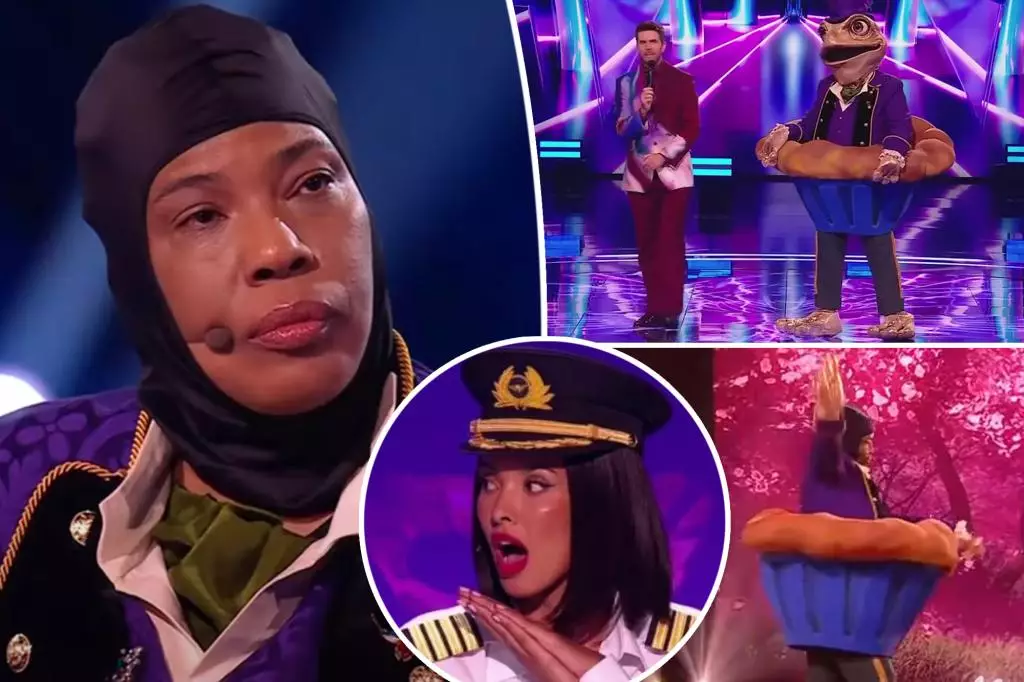The recent episode of “The Masked Singer UK” witnessed an unexpected and dramatic turn when music artist Macy Gray, renowned for her hit “I Try,” stormed off the stage after her elimination. This incident, which unfolded before a live audience, raises questions not just about her reaction but also about the pressure and emotional investment that celebrities experience in reality competition shows. Gray’s response was met with backlash from fans, many of whom labeled her a “sore loser,” prompting a reevaluation of the expectations placed on public figures in high-pressure environments.
As the night progressed, the judges—Jonathan Ross, Davina McCall, Mo Gilligan, and Maya Jama—made the decision to save the “Bear” character over Gray’s “Toad in the Hole.” Gray’s immediate departure was met with stunned faces among the panelists, signaling the shock that her exit was eliciting. The host, Joel Dommett, attempted to maintain a light-hearted atmosphere, but the tension was palpable. His awkward remark, “What is going on?” reflects not only his discomfort but also the potential pitfalls of live television.
The fallout from Macy Gray’s unexpected exit was swift. The video clip showcasing her dramatic walk-off soon went viral on social media, drawing comments from viewers who varied in their support and criticism. Many responses highlighted a perception of rudeness and an inability to cope gracefully with defeat. One social media user noted, “Macy Gray was clearly pissed off,” capturing the sense that her body language did not align with the lighthearted spirit of the show. Such reactions underscore the challenge celebrities face when their personal emotions clash with public expectations.
Moreover, her brief, curt responses during the post-elimination interview revealed a deeper discontent. When Dommett inquired about her experience, Gray’s short answers lacked the enthusiasm typically expected from contestants who had participated in a potentially transformative experience. The question remained: Could this display reflect underlying frustrations with the competition or perhaps a misalignment between her public persona and her private feelings?
In the era of digital media, scrutiny of celebrity behavior is more intense than ever. The rise of platforms like X (formerly Twitter) and Instagram allows fans to voice their opinions in real time, often leading to a collective judgment that can quickly spiral out of control. The criticism directed at Gray suggests that people expect entertainers to embody a certain level of professionalism and grace, even in less-than-ideal situations. As one user poignantly articulated, Gray’s behavior created a discomfort for viewers and fellow contestants alike, emphasizing how celebrity culture often places them on precarious pedestals.
Moreover, the incident showcases a broader commentary on competition-based reality shows. Participants often invest much of their emotional energy into the process, and when faced with rejection, their reactions can be exaggerated. Understanding this emotional turmoil is essential for fans who may not account for the personal stakes involved.
Producers of reality shows, including “The Masked Singer,” have a responsibility not just for entertainment but also for fostering an environment where contestants feel free to express themselves without fear of backlash. It raises questions about the ethical implications of how these competitions are framed. Viewers are often drawn to the drama, yet the emotional wellbeing of contestants should not be sacrificed for the sake of entertainment value.
Macy Gray’s walk-off serves as a critical reminder of the human aspect of reality competitions. While her behavior was scrutinized, it opens the door to a more profound discussion about celebrity expectations, the nature of competition, and the emotional toll these experiences can exert. As fans and spectators, it’s important to recognize that even those in the public eye grapple with feelings of disappointment, and how they handle those moments can vary significantly. Acknowledging this complexity enriches the conversation around celebrity culture and reality television, urging for a more compassionate viewpoint.


Leave a Reply